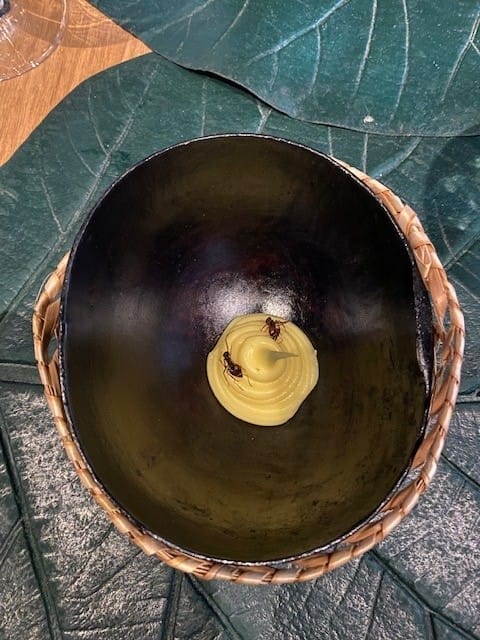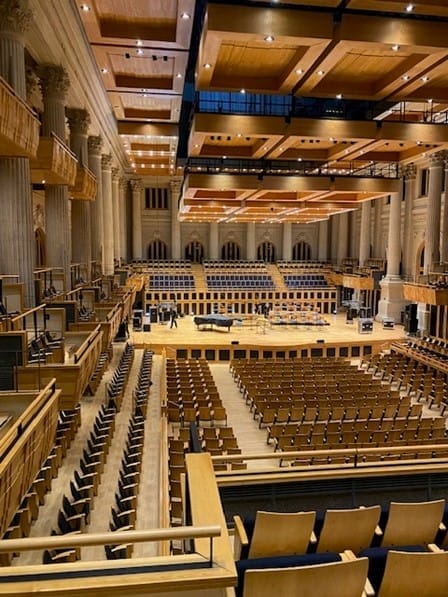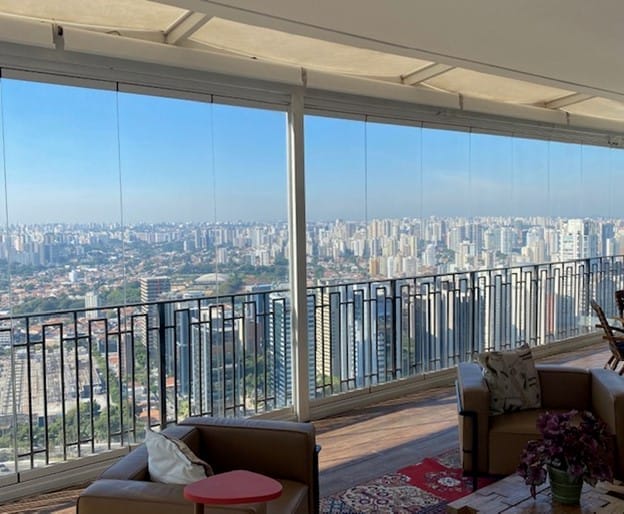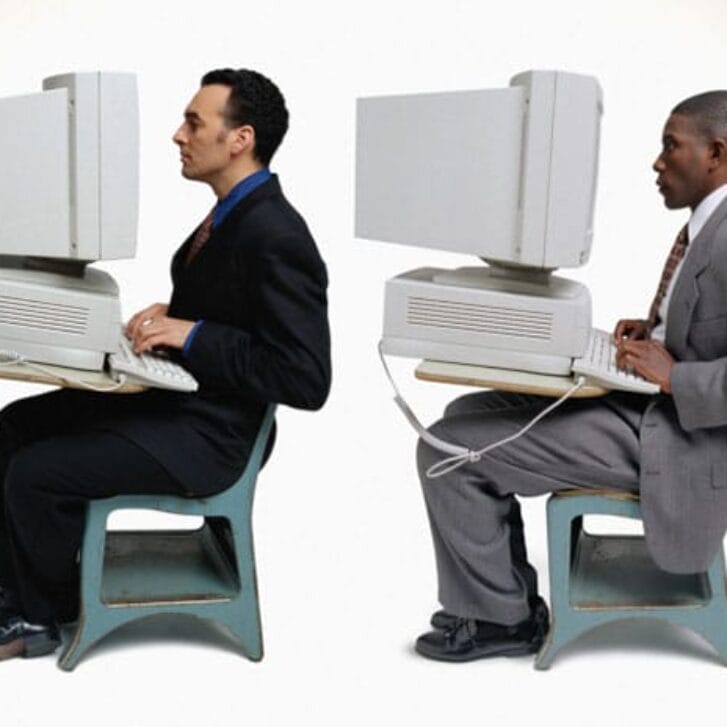On my way to São Paulo, Brazil, for my ninth Wharton Global Forum, it becomes apparent that the international event is now a habit of mine. I’m fortunate that my husband, Charles, is usually game to jump on a plane, explore a new place, and meet new people. Many times, we use a Forum as the springboard to a family vacation, as we did for the 2018 Forum in Sydney. After the event, we camped in the outback, hiked around the base of Ayres Rock, and snorkeled in the Great Barrier Reef.
Hard to believe I’ve attended nine Forums! And hard to believe it’s been 25 years since I was last in São Paulo. The city has grown and become so much more modern. Its size overwhelms; with a population of 20 million, it’s the largest city outside of Asia.
As a Global Forum veteran, Wharton Magazine asked me to keep a diary of my time at the Sao Paulo Forum to share the experience of learning from Wharton faculty, reconnecting with fellow alumni, and immersing in local culture.
Day 1: Friends

I visited the São Paulo University Museum of Art with Lia Camara, Eduardo Camara WG81, and Stacie Hyatt WG00 (that’s me on the far left). Images courtesy of Cathryn Taylor.
I love arriving at the Forum city at least a day before it starts, to get acclimated. I flew through Dallas and met up with a friend, Stacie Hyatt WG00. Our friends Eduardo Camara WG81 and Marilia “Lia” Camara arranged to have a driver meet us at the airport — it sure is nice to arrive in a new city and not to have to think. As part of the Eduardo and Lia custom tour, we enjoyed a traditional Brazilian lunch; overlooked the city from the top of an historic Art Deco building, the Banco De São Paulo; visited the São Paulo University Museum of Art; and meandered through Ibirapuera Park.
Day 1: Sabor y Cultura (Taste and Culture) Trek
The organized treks on the day before the Forum offer behind-the-scenes access to local culture that a regular tourist wouldn’t have. At the 2019 Forum in London, I went on a retail trek that included a private tour of Harrods before the store opened.

Amazonian appetizer topped with ants.
In São Paulo, our trek group started out at Banzeiro, an award-winning restaurant featuring Amazonian cuisine. Our first dish was an appetizer of Sáuva ants served with a cassava puree. The ants were crunchy and had a surprisingly floral taste — wholly unexpected, and a gastronomic adventure I never would have experienced on my own.
The rest of the meal wasn’t as adventurous, but it was full of new and interesting textures and flavors. For the main course, we enjoyed a type of Amazonian fish ribs, grilled to perfection.
Seated not far from me was Gavin Ho WG21, with whom I had lunch last year during the Greenery in Architecture trek in Singapore! The opportunity to build friendships with fellow Whartonites living around the world is such an added bonus.

São Paulo Symphony Center – complete with a movable ceiling and stage.
From Banzeiro, we went to the historic train station, where our guide provided an overview of Brazilian history and economic development. We learned that public transportation has never been a priority for the nation and hasn’t even been maintained. As a result of the de-emphasis on rail transport, a section of the grounds of the historic train station has now been converted to an exceptional orchestral hall where the São Paulo Symphony performs. It’s so technologically advanced that the size of the stage and the height of the ceiling are adjustable, to best fit the scheduled performances. Watching the mechanisms that produce the transformation was phenomenal!
Day 2: Forum — Opening Day
I spent my morning at a Women in Business panel, where professors Martine Haas and Nancy Rothbard presented on the impact of hybrid work on working women. The session closed with a lively and practical discussion with three local alumnae businesswomen of varying career stages and perspectives: Rebeca Ouro-Preto WG00, Sheynna Hakim G11 WG11, and Alice Lepique G22 WG22. What impressed me most at this session was how candid the panelists were in their remarks and the number of men who actively engaged in the conversation, showing a genuine desire to support women in the workplace. The cherry on top was that three or four of the men brought their daughters with them to the Forum.

Walking in Ibirapuera Park with Eduardo Camara and Stacie Hyatt. I have to say I was very jealous of São Paulo’s climate, being from the Midwest: Sao Paulo is green year-round.
In the opening session, Marcos Galperin W94 was interviewed by Dean Erika James. Marcos is known as the “Jeff Bezos of South America,” as he co-founded MercadoLibre, the largest online commerce and payments company in Latin America. Among MercadoLibre’s many awards, in 2023 Time included it on its list of the 100 most influential companies in the world. Marcos almost never gives interviews, so hearing him speak on how his business has transformed since its initial founding in 1999 was very special.
Another absolute standout speaker at the Forum was Roberto Sallouti W94, CEO of BTG Pactual, one of the largest banks in Brazil. Roberto shared his experiences and insights at the bank, but what really impressed me was his commitment to education. Recognizing a need for more technology graduates in Brazil, in 2021 he co-founded the Institute of Technology and Leadership. Roberto exemplifies how Wharton graduates go out and make a difference — in their businesses, in their communities, and in the world.
One of my favorite Forum features is the “Joe Talks.” Structured like TED Talks, Joe Talks feature brief, dynamic presentations on a range of subjects. In one such talk, real estate professor Fernando Ferreira discussed how São Paulo has changed its zoning to positively impact housing availability.

São Paulo Forum Organizing Committee
While you’re studying at Wharton, it’s easy to access innovative ideas. Once you’re out of the academic environment, though, engaging in new learning is an active outreach — it doesn’t just come to you. The Symphony Center with the movable stage and the São Paulo zoning law challenges are ideas I discovered at the Forum that I wouldn’t have been exposed to had I not attended.
The day closed with cocktails and more opportunities to meet Wharton people of all ages and backgrounds.
Day 3: Forum — Closing Day
The second Forum day kicked off with an inspiring announcement by professor Eric Bradlow to introduce the new AI and Data Analytics major at Wharton and reveal that all new Penn students will receive a ChatGPT license. That was a perfect segue into professor Ethan Mollick’s practical demonstration of AI, during which he encouraged the audience to try out the powerful tool. As a bonus, those who registered early for the Forum were gifted his new book, Co-Intelligence: Living & Working with AI.

Partial view of the enormity of São Paulo. I could see the elegant Octavio Frias de Oliveira Bridge from my hotel room.
Professor Zeke Emanuel never fails to impress and inspire. His panel discussion with engineering dean and roboticist Vijay Kumar and Penn trustee Alberto Duran WG93 focused on the intersection of medicine, business, and technology. Of the top four recent advancements in medical technology — CRSPR, gene therapy, mRNA and CAR-T cell therapies — three were started at Penn.
The final keynote featured the story behind the NFL’s expansion of its brand internationally with the upcoming Philadelphia Eagles exhibition game in São Paulo. If you love to learn, the Global Forum was two full days of brain candy.
The closing dinner was held at the Rosewood São Paulo hotel, a lush oasis of greenery built around an historic chapel. It featured lots of music, great local cocktails, and a feast of typical Brazilian foods. Swag lovers walked away with Wharton-branded flip-flops — such an appropriate memory of Brazil!
I’m frequently asked why I go to the Global Forums so frequently. My answer is simple: people. I hear great people speak, sharing their knowledge and experience. I meet new people while strengthening relationships with Wharton friends I’ve made over the years. So the appeal of the Forum is simple for me: It’s about people.
























